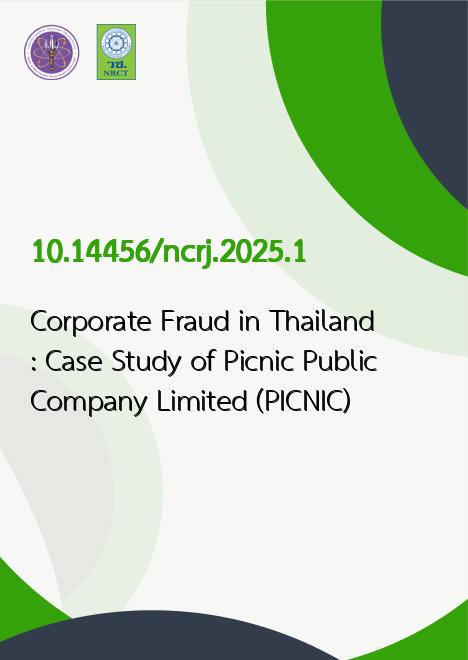
|
Corporate Fraud in Thailand: Case Study of Picnic Public Company Limited (PICNIC) |
|---|---|
| รหัสดีโอไอ | |
| Creator | Nares Kesaprakorn |
| Title | Corporate Fraud in Thailand: Case Study of Picnic Public Company Limited (PICNIC) |
| Publisher | National Institute of Development Administration |
| Publication Year | 2568 |
| Journal Title | NIDA Case Research Journal |
| Journal Vol. | 17 |
| Journal No. | 1 |
| Page no. | 1-31 |
| Keyword | Corporate Fraud by Financial Statement Manipulation, White-Collar Crime, Directors' Criminal Liability, Legal Accountability of Legal Entities |
| URL Website | https://so04.tci-thaijo.org/index.php/NCRJ |
| Website title | NIDA Case Research Journal |
| ISSN | 2822-0978 |
| Abstract | This case study examines the criminal liability of directors at Picnic Public Company Limited (PICNIC), a listed company on the Stock Exchange of Thailand (SET). The directors allegedly committed fraud and misconduct to transfer company profits to other non-SET companies affiliated with PICNIC's major shareholders. The alleged scheme involved PICNIC nominating a subsidiary to commit fraud through financial statement manipulation. This manipulation aimed to create a public misperception of PICNIC's revenue and capital. Falsely inflated figures were intended to deceive investors into believing the company had higher revenue and financial stability, thereby attracting investment. Specifically, the subsidiary created a fraudulent rental contract for gas tanks. This contract had no intention of being fulfilled but was solely intended to manipulate financial statements. A falsified budget for 2004 claimed an expected revenue of 7,350,500,000 baht and a profit of 178,440,072 baht. This fraudulent behavior was deemed criminal as it violated the Capital Market Supervisory Board's conditions and procedures. Consequently, the directors are legally liable for their actions as major shareholders involved in or permitting the creation of a fraudulent and misleading financial statement. This behavior justifies holding the committee or directors representing the subsidiary accountable for the economic and financial losses incurred. Their actions constitute "white-collar crimes." Furthermore, the nominated company committed legal misconduct by failing to disclose its financial statements according to the Capital Market Supervisory Board's guidelines, criteria, and methods. However, due to its non-existent legal entity status, the company received a fine instead of facing individual-level punishment. |